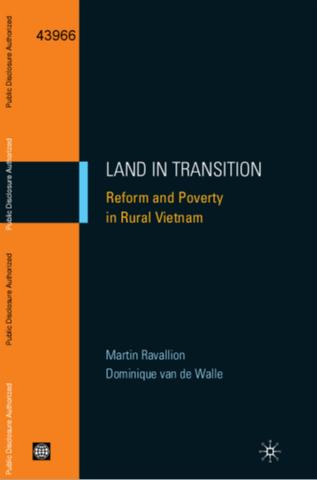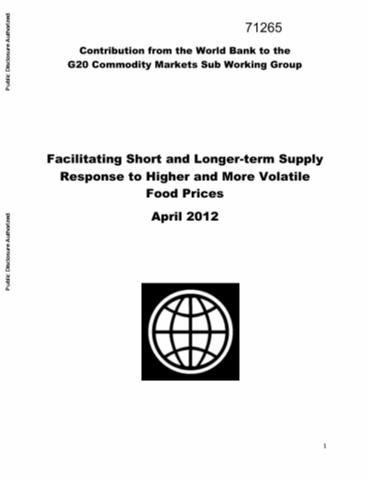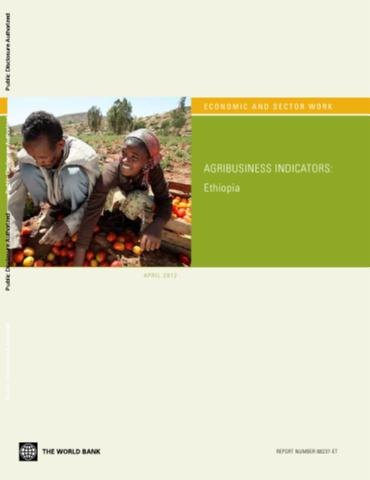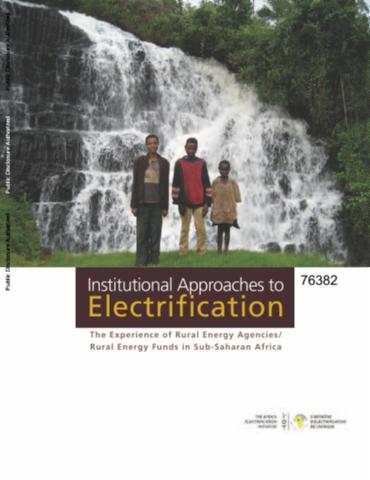The World Bank is a vital source of financial and technical assistance to developing countries around the world. We are not a bank in the ordinary sense but a unique partnership to reduce poverty and support development. The World Bank Group has two ambitious goals: End extreme poverty within a generation and boost shared prosperity.
- To end extreme poverty, the Bank's goal is to decrease the percentage of people living on less than $1.25 a day to no more than 3% by 2030.
- To promote shared prosperity, the goal is to promote income growth of the bottom 40% of the population in each country.
The World Bank Group comprises five institutions managed by their member countries.
The World Bank Group and Land: Working to protect the rights of existing land users and to help secure benefits for smallholder farmers
The World Bank (IBRD and IDA) interacts primarily with governments to increase agricultural productivity, strengthen land tenure policies and improve land governance. More than 90% of the World Bank’s agriculture portfolio focuses on the productivity and access to markets by small holder farmers. Ten percent of our projects focus on the governance of land tenure.
Similarly, investments by the International Finance Corporation (IFC), the World Bank Group’s private sector arm, including those in larger scale enterprises, overwhelmingly support smallholder farmers through improved access to finance, inputs and markets, and as direct suppliers. IFC invests in environmentally and socially sustainable private enterprises in all parts of the value chain (inputs such as irrigation and fertilizers, primary production, processing, transport and storage, traders, and risk management facilities including weather/crop insurance, warehouse financing, etc
For more information, visit the World Bank Group and land and food security (https://www.worldbank.org/en/topic/agriculture/brief/land-and-food-security1
Resources
Displaying 4001 - 4005 of 4907Land in Transition : Reform and Poverty in Rural Vietnam
The policy reforms called for in the
transition from a socialist command economy to a developing
market economy bring both opportunities and risks to a
country's citizens. In poor economies, the initial
focus of reform efforts is naturally the rural sector, which
is where one finds the bulk of the population and almost all
the poor. Economic development will typically entail moving
many rural households out of farming into more remunerative
Facilitating Short and Longer-Term Supply Response to Higher and More Volatile Food Prices
International food prices spiked for the second time in four years in early 2011, igniting concerns about a repeat of the 2008 food price crisis and its consequences for the poor. International food price uncertainty has also increased along with average levels. Although price volatility is an intrinsic characteristic of agricultural markets, it has increased markedly over the last five years, compared to the previous two and a half decades, even when controlling for inflation.
Agribusiness Indicators
Because agriculture is the economic backbone of most countries in Sub-Saharan Africa, including Ethiopia, any meaningful sustainable development program in the continent must therefore be anchored in the sector. The concept for this study on agribusiness indicators was based on the vital role that agribusiness plays in agricultural development. The study focuses on agribusiness indicators (ABI) to identify and isolate the determining factors that lead private investors and other stakeholders to participate in agribusiness and to engage in discourse regarding its development.
Agribusiness Indicators
Mozambique, the only Lusophone country covered in the agribusiness indicators initiative, has had a turbulent history since independence. Civil unrest over some 20 years and frequent drought in southern Mozambique, coupled with floods near the many waterways that transect the country (mainly east-west), have inhibited an agricultural transformation. Even so, Mozambique could be a regional breadbasket. The country has much potentially usable arable land, along with access to river water for irrigation in many agricultural production zones, particularly in central and northern Mozambique.
Institutional Approaches to Electrification
Energy poverty is a global problem: access to energy services is crucial to meet basic household needs, deliver and access public services, and generate income. Less than 10 percent of Sub-Saharan (SSA) rural households have access to electricity, with an overall access rate below 25 percent. One of the main obstacles for SSA electrification practitioners is the difficulty in obtaining practical and timely knowledge on how to overcome economic, technical, institutional, and political barriers to electrification in their day-to-day work.










